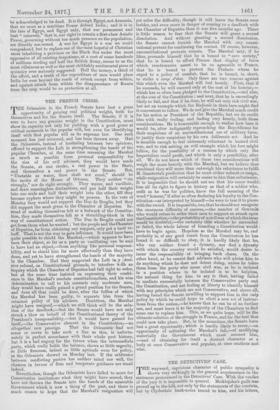TOPICS OF THE DAY.
THE FALL OF LABS.
slaughter inevitable in a successful attack. The Russian General, however, evidently conceived that if the attack were made by night, the power of the breechloader would be re- duced one-half ; and that if his men effected an entrance, none but the regulars would resist either intelligently or firmly. The half-trained men of whom the garrison was known mainly to consist would be bewildered by an assault delivered on many places at once, by the darkness, and by that vague terror which haunts all Asiatics at night. It was a tremendous risk to run to deliver such an assault at night, but he knew that his men, made confident by the recent victory, would obey orders implicitly. He had good information from Armenians within the garrison,—we take it, the treachery so readily ascribed to Turks by their worshippers is in this war unjustified,—the end was worth the danger, and waiting only for a clear night, he made the desperate attempt. It succeeded thoroughly. The Russians, with the cool daring for which Turks alone get credit in this country, assailed five of the seven redoubts—two of them by escalade—and though their leader, Count Grabbe, fell at the first onset, forced their way in, after a resistance protracted through the night, in which 5,000 Turks and 2,700 Russians were killed and wounded. The remaining two forts were captured in the morning, and then the survivors, most of them half-disciplined men, and between 7,000 and 10,000 in number, broke away in a panic-stricken rout towards Erzeroum. They can, however, have carried no food, their ammunition must have run short, for troops flying in that way outstrip ammunition-carts, even if they had any, and they surrendered without a struggle to the cavalry sent in pursuit. The entire garrison of Kars, 300 Krupp guns, and the great fortress of Armenia remained in Russian hands. Arrangements for the garrison had no sooner been made, than General Loris Melikoff on the same evening started for the Army besieging Erzeroum, and after him were despatched the 17,000 men who, by some blunder of the bulletin-makers, are stated to be ordered to Plevna, where, while Hobart Pasha commands the sea, they could not arrive for months. With this reinforcement General Melikoff ought to be able to take Erzeroum, the garrison of which is demoralised by defeat, and commanded by Mukhtar Pasha, a General who has evidently many personal qualities, or he would not be so praised by British correspondents, and who has shown gleams of a desire to fight in a civilised way, but who has been defeated oftener than any commander in the Turkish service, oftener even than Suleiman Pasha, the fighting General who never wins. We expect speedily to hear of the evacuation of Erzeroum, and then Turkish Armenia will, for this war, be in Russian hands. Like the journalists who are now trying to excite Great Britain to declare war for Turkey, we do not believe that the Russians will ever let go their grasp upon this province, and like them, though for a different reason, we are keenly aware of its value to the conquering country. The province of itself is of no benefit to Russia, which is already overloaded with thinly-peopled territory, most of it as unproductive to the Treasury as our own vast lands between Ottawa and the Pole. But with the ancient kingdom there goes to Russia the hearty allegiance of a splendid race, the Armenian people, which, in latent intellectual power, in capacity for money-making, and in readiness to settle in all climates and capacity to thrive in all, le surpassed, if it is surpassed, by the Jews alone. There are Armenians all over the earth, but outside Armenia no man ever saw a pauper Armenian. Moreover, the Armenians have an aptitude which Jews, though they probably possess it, have, through the pressure of adverse circumstances, seldom as yet displayed. Wealthy merchants in Calcutta, where they are also, of all friends of education, the most zealous ; in China, monopolisers of the opium trade; in Java, bankers to the Dutch ; in England and France, rivals of the Greeks ; in Venice, the most respected of all monastic orders ; the Armenians in Russia. are known as among the bravest of soldiers, the most astute of diplomatists, and are—we speak on Armenian authority given us years before this war—absolutely relieved of that political disability which in Western Europe still prevents their rise. An Armenian has sat in the House of Commons, but in England, France, and America they have got. no higher. The General who commanded at the battle of the Borodino was an Armenian. The most dangerous Russian diplomatist ever resisted in Stockholm was an Armenian. In this war for life and death the Russian armies in Asia are en- trusted to an Armenian. Christians, yet not Catholics, and not Protestants ; Asiatics, and yet white men of the true Indo- Germanic breed, the Czars trust Armenians as Russians ; and in return, Armenians throughout the world, though almost in- variably desirous of the independence of a nation which they. believe to be nearly as old as Ararat, which has as separate Es creed as the Jew and nearly as separate a history, are, failing that independence, willing Russians. The gain to be derived from the adhesion of such a race is immense, and we make no pretence to deny its value. But then it is justly-acquired gain.. There is no Christian race in the world whom Turkey could so easily have conciliated as the Armenians. They wanted autonomy, not Russian rule. Unlike the Jews, they remain, though Christians, in many respects Asiatics in feeling ; they had no special quarrel with their conquerors for being Asiatics, and had they been even decently treated, would have become Turkish as Jews become Frenchmen, Germans, or Italians. The Turks, though thoroughly aware of these facts, and dispoied to trust themes they trust no other Christians, massacredthem,plundered them, and insulted them like everybody else, till it is no safer around Lake Van to be an Armenian than in Philippopolis to. be a Bulgarian. The Armenian, a great citizen in Russia, is in Turkey a Giaour, a dog, whose evidence cannot be received.. Therefore the race has turned to Russia, and the Czars have a right to the loyalty evolved by their own spirit, it may be politic, it may even be contemptuous, of justice and conciliation. The United States might as well denounce us because, in the hottest agony of conflict, the Red Indian seeks refuge with "the White Mother who never breaks her word "—an incident not six weeks old—as we quarrel with the Armenians for their gratitude to St. Petersburg. The Czars will govern the country kindly, though it is possible that the Eighth Command.. merit may be pressed on the attention of the Kurds, as we press it on the attention of the Afreedees ; and it is well that the only Christian race in Asia, a million and a half strong, should have its chance of civilisation. If the Russian Treasury benefits by the conquest, which is possible, as the people are able and industrious, and not conquered, but only relieved of their Mahommedan task-masters, so much the better. It was the duty of all Europe to liberate the Christians from the Turks, by force, if needful, and as Europe left the work to be performed by Russia alone, it is only reasonable, as we pointed out before the war broke out, that Russia should have some compensation for her sacrifices ; and no compensation could be more fitting them a province whose rightful owners have learned by experience that next to self-government, which is, unhappily, as yet out of the question, the Russian Government is the one under which they are treated with the greatest fairness. But English interests ? In what way are they compromised ? By the addition of a large and rich territory to Russia ? It is neither so large nor so rich as the province of the Transvaal which Lord Carnarvon annexed yesterday, with the consent of everybody except Mr. Dourtney and Mr. Hugh O'Donnell. It is worth nothing as in addition to the resources of Russia for war compared with that natural increment which, now that emigration has declined, adds 200,000 a year to our popula- tion. As for its geographical position, it is a pure delusion. The possession of Armenia by the Russians brings them no nearer the Persian Gulf than they are now, and extension southward would bring them to the precise place where we could fight them with least injury to India. It is true that with the loss of Armenia, Asia Minor becomes more difficult for the Sultan to defend ; but that is only a reason for dispensing with a Sultanet which cannot defend it own provinces or find allies among decent civi- lised men, not a reason for insisting that a corpse shall not be acknowledged to be dead. It is through Egypt, not Armenia, that we must as a maritime Power defend India ; and it is in the fate of Egypt, and Egypt only, that our permanent and best " interests," that is, our right to remain a first-class Asiatic Power, governing without too much pressure on the population, are directly con eerned. A. war for Egypt is a war we could comprehend, but to replace one of the most hopeful of Christian races inhabiting a province on the Black Sea under the most oppressive of all existing despotisms, at a cost of some hundreds of millions sterling and half the British Army, seems to us the most villainous as well as the most childishly sentimental piece of quixotry ever seriously suggested. Half the money, a third of the effort, and a tenth of the expenditure of men would place India for ever beyond the reach of attack except from within, and against attack from within the disappearance of Russia from the map would be no protection at all.







































 Previous page
Previous page